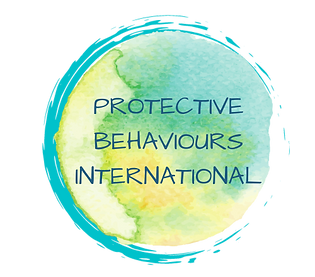
PBI's work rests on two interconnected pillars
Pillar One: The Central Theme:
"We all have the right to feel safe"
“We all have the right to feel safe all the time” underpins every aspect of Universal Protective Behaviours training. It affirms that safety isn’t a privilege for certain situations or individuals, and is in fact a constant, non‑negotiable right. This theme helps participants recognise when they feel safe and when they don’t, to identify internal warning signs, and to decide which type of support might be needed.
Pillar Two: Universal Protective Behaviours Psychosocial Framework that guides how those rights are practised.

The Psychosocial Framework of Universal Protective Behaviours has a structured framework that helps people translate the central theme into daily practice. The framework has three key elements:
Language of Safety: A relational communication model built around four core components:
Quality, Clarity, Shared Meaning and Ownership. When all four elements of the Language of Safety are taken into account, we can say we are observing a ‘language of safety’ and putting into practice our right to feel safe with the responsibility to respect others' right to feel safe at the same time. This model is both internal and external and includes both the content (what) as well as the process (how) of our language.helps individuals discuss safety, set boundaries and negotiate needs. By learning to articulate feelings and expectations, participants create environments where psychological and emotional safety are actively maintained.
Unwritten Rules: These refer to implicit social norms and expectations that shape behaviour but are rarely discussed. In PBI training, participants learn to recognise how these “rules” influence their decisions and interactions. Understanding unwritten rules empowers people to question harmful norms, make conscious choices and advocate for safer practices.
Feelings, Thoughts and Behaviours: PBI emphasises the interplay between emotions, thoughts and actions. Recognising how feelings and thoughts drive behaviour helps participants respond proactively rather than reactively in uncertain situations. By naming emotions and examining thought patterns, individuals can choose behaviours that promote their own safety and the safety of others. By integrating the right to feel safe with this psychosocial framework, Protective Behaviours International equips individuals and organisations to build cultures where safety is consciously understood, communicated and protected.
A little bit more about Us:
Protective Behaviours began in the 1970s with social worker Peg West, whose pioneering program helped children articulate their right to safety. Over the decades, the program spread globally, addressing not only children’s wellbeing but the broader need for psychosocial and psychological safety in all sectors.
By 2017, long‑time trainers and close friends Bronwyn Clee and Di Margetts concluded that the Protective Behaviours community needed a consistent training and development framework in Australia and beyond. Bronwyn, who was originally trained in 1997, and Di, who learned directly from Protective Behaviours pioneer Peg Flandreau West, consulted with Jodie Ferguson of PB West to bring together key practitioners and advisors. From this collaboration, Bronwyn and Di founded Protective Behaviours International to preserve the integrity of the program and extend its reach.
Today, PBI delivers universal training and development opportunities around the Central Theme and the Psychosocial Framework: Language of Safety Unwritten Rules and the interplay between Feelings, Thoughts and Behaviours.
Protective Behaviours International works in collaboration with The Institute of Hope (IOH) and aligned Change Makers and Truth Tellers, often co-branding products and services. The newly released Podcast "Feeling Safe & Standing Strong" will soon be found both here and over at IOH.
We pay our respects to the late, great Di Margetts. Di mentored so many people around the world on their Protective Behaviours journeys, and loved to remind us:
"we can have loads of fun doing serious work."
Di dedicated so much of her life to sharing her passion for Protective Behaviours and never wore the shoes of the PB Police!
Di firmly believed there wasn't a conflict in the world that couldn't be resolved through the Language of Safety and did all she could to truly live an adventurous life.

Protective Behaviours International is a partner with the Protective Behaviours Association.
Our team maintains close ties to the global Protective Behaviours community. Bronwyn Clee currently serves as the Association’s Vice President, while Jodie Ferguson and Kylie Tune contribute as certified International Trainers. These roles reflect our commitment to upholding international standards and ensuring our programs align with the latest developments in Universal Protective Behaviours practice.
Our International Partners
Partners in the Protective Behaviours Training Partnership have been working with the PB process for over 25 years, developing resources, implementing PBs within their workplaces and training others to use PBs in their role.
"The Protective Behaviours Training Partnership Partners agree all training will be consistent with the PB process and use high quality materials to support learning. Training will be evaluated to indicate progress made towards meeting individual course outcomes and identify any further training requirements."
Partnership trainers have committed to holding and renewing the relevant training insurances as well as on-going peer observation, consultation and supervision in order to maintain the quality of the training offered. Please click here to learn more about The Protective Behaviours Training Partnership

PBI COMMITMENT
We are committed to establishing and maintaining a consistent professional training and development framework. This framework is to support individuals, groups, agencies and organisations with appropriate and unrestricted standing* who are applying aspects or the entirety of The Universal Protective Behaviours Empowerment Program.
*definition of appropriate and unrestricted standing:
Current police check and child safety screening; has not been denounced from or struck off any professional body.





